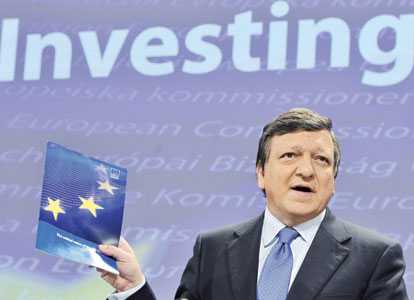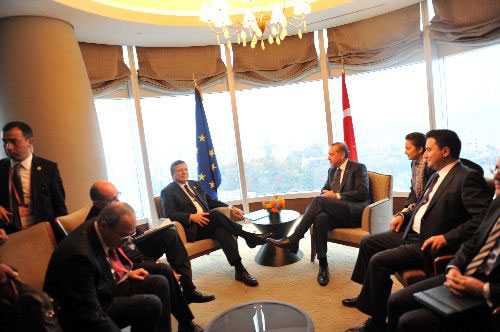The proposed European Union budget for 2014-2020 calls for imposing new taxes on citizens and companies, marking a period of fiscal tightening. The draft budget, unveiled on Wednesday by Jose Manuel Barroso, makes no mention of Turkey, meaning that Ankara will have to wait until ‘at least’ 2020 to enter the EU

European policy makers have proposed a tightening of belts across the European Union as part of a new 2014-2020 budget that seeks to respond to gaping public debts ravaging the southern flank of the bloc. The new budget, however, makes no mention of Turkey, implying that the EU-aspirant country will not be accepted until “at least” 2020.
The EU budget proposed Wednesday by the European Commission urges the introduction of an EU-wide sales tax and a new financial services tax. The budget proposal, unveiled in Brussels, spans the 2014-2020 period and totals 1.025 billion euros.
But as the Hürriyet Daily News first reported April 20, the proposed budget does not include Turkey.
The EU began membership talks with Turkey in 2004, but has avoided providing a specific target date, something it has offered to other candidates that later joined the 27-nation bloc. The EU ruled in 2004 that while the objective of negotiations is accession, such talks are an open-ended process and the outcome of this process “cannot be guaranteed.”
Speaking in Brussels on Wednesday, European Commission president Jose Manuel Barroso defended the draft budget. The EU needs “an innovative budget” where “every euro spent reaches its target,” Barroso said.
Under the draft, the monies raised directly through new measures such as an EU value-added tax, or VAT, and a financial transactions tax worth 30 billion euros per year would bring in more than 40 percent of EU revenue. Contributions from member states, which currently account for 76 percent of total revenue, would drop to around one third, Agence France-Presse reported.
The remainder is funded through customs tariffs at the EU borders, a portion of VAT gathered by member states, and taxes paid by EU civil servants.
The new VAT would be levied across the 27-nation bloc, with a fixed 1 percentage point raised by governments and transferred directly to the EU from 2014.
The commission is also proposing to allocate 376 billion euros for the 2014-2020 period for spending on “cohesion policy instruments,” which aim to create a more harmonious union. This amount includes 162.6 billion euros for convergence regions, 38.9 billion euros for transition regions, 53.1 billion euros for competitiveness regions, 11.7 billion euros for territorial cooperation and 68.7 billion euros for the Cohesion Fund. None of these include Turkey or its regions. However, Greece and Greek Cyprus, as EU members, will be able to benefit from the Cohesion Fund.
Tobin-style tax
To top up the EU executive’s ability to levy resources, the commission suggested a Tobin-style tax on financial transactions in Europe. However, this suggestion is likely to be opposed by Britain, France and Germany, which favor an international tax rather than a European one.
Debate over the budget is likely to continue until 2012, with the European Parliament also likely to step in with its opinion on spending.
Compared to the current 2007-2013 budget, Brussels is suggesting a 5 percent hike in volume.
On Thursday, Germany blasted the proposal as “irresponsibly high,” saying it set a poor example during the eurozone debt crisis.
“The commission’s total volume of the budgetary framework is, for the German government, irresponsibly high,” Foreign Minister Guido Westerwelle said in a statement.
via Turkey absent in new EU budget – Hurriyet Daily News.


